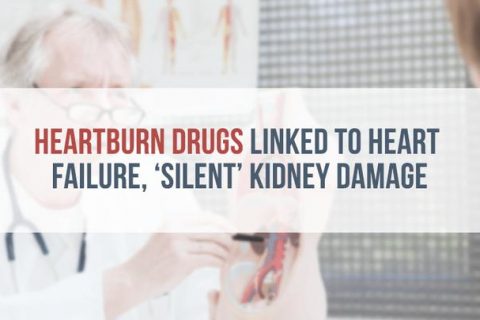Proton Pump Inhibitor (PPI) Side Effects
Minor side effects of short-term PPI use include headache, dizziness, rash, diarrhea, nausea, flatulence and constipation. Long-term usage may lead to chronic kidney disease, bone fractures, dementia, pneumonia, vitamin B12 deficiency and Clostridium difficile-associated diarrhea.
PPI Side Effects Commonly Reported in Clinical Trials
The most frequently reported PPI side effects in clinical trials vary depending on the brand of PPI.
- Abdominal pain
- Constipation
- Diarrhea
- Dizziness
- Fever
- Flatulence
- Headache
- Nausea
- Rash
- Stomach pain
- Vomiting
Studies have linked proton pump inhibitors to serious, sometimes life-threatening side effects. Higher dosages and long-term use increase the risk for many of those complications.
Prolonged use of these medicines can cause kidney disease, injury and failure. It can also lead to heart attacks, cancers and bone fractures. Other side effects range from vitamin B12 deficiency and low magnesium levels to pneumonia and Lupus erythematosus events.
Recent studies have also associated long-term use with chronic kidney disease (CKD). The U.S. Food and Drug Administration has not told manufacturers to add a CKD warning to the drugs’ labels. However, the agency does require a warning for a serious drug interaction with PPIs and the blood thinner Plavix (clopidogrel). Labels also alert consumers of adverse reactions that were most common in clinical trials, such as diarrhea and nausea.
Serious side effects are rare and it is not clear how often they occur. But 1% or more of adults will experience the more common side effects. Two percent of patients 17 years old or younger may also experience less serious side effects.
In clinical trials involving Nexium, 4.3% of adult participants reported experiencing diarrhea while 2.8% of pediatric patients reported that same common side effect. The drugs’ labels caution that the rates in clinical trials may not reflect rates in the real world.
More serious side effects are considered rare but it is not clear how often they occur.
Kidney Disease, Injury and Failure
Studies dating back to the 1990s have associated PPIs with kidney problems. Recent research underlined the risks.
A 2017 study in the journal Kidney International found long-term use could lead to “silent” kidney damage. Researchers looked at 125,000 patients over five years. They zeroed in on those who developed chronic kidney disease (CKD). Half the people who developed the condition had never experienced kidney problems before starting the drugs.
“Our results indicate kidney problems can develop silently and gradually over time, eroding kidney function and leading to long-term kidney damage or even renal failure.”
A 2016 study in the Journal of the American Society of Nephrology found long-term users were more likely to develop progressive CKD and experience kidney failure. This is also called end-stage renal disease.
A different 2016 study in the journal JAMA Internal Medicine associated long-term use with a 20% to 50% higher chance for developing CKD. Researchers found no similar risk for people taking H2 blockers like Pepcid or Zantac.
Acute Interstitial Nephritis (AIN)
Allergic reactions to PPIs may trigger acute interstitial nephritis (AIN), a condition that causes the spaces between kidney tubules to swell.
In 1992, the American Journal of Medicine published an article on what is believed to be the first case of drug-induced AIN due to Prilosec.
In 2004, researchers writing in the journal Nephrology, Dialysis, and Transplantation concluded Prilosec and Prevacid are the “drugs most commonly associated with interstitial nephritis.”
In 2007, other researchers writing in Clinical Nephrology identified an “ever increasing number of cases of acute interstitial nephritis associated with PPI therapy” and that “all PPIs have been documented to cause AIN.”
Despite multiple studies finding a connection between drugs and acute interstitial nephritis, the FDA did not require manufacturers to add AIN warnings to labels until 2014.
Clostridium Difficile (C. diff.) and Pneumonia Infections
Gastric acid kills some harmful bacteria in the stomach. PPIs may reduce gastric acid that protects against infection.
This may cause Clostridium difficile (C. diff.) infections (CDI). The serious infections can spread if there is not enough acid to keep bacteria in check. This can lead to severe diarrhea and life-threatening inflammation of the large intestine.
In 2012, the FDA put out a safety communication saying PPI use can increase the chances for C. difficile diarrhea. And in 2014, the agency required some manufacturers to add a warning about the risk to their labels.
Researchers in a 2015 study compared twins. One twin took PPIs, the other did not. Researchers found that the twin taking the drug had far more bacteria that can cause infections than the twin who did not take the drug. Researchers published their results in the BMJ journal Gut.
Most recently in 2017, a study in the journal JAMA Internal Medicine associated PPI use with a 50% increased risk of C. diff. infections.
Studies also link PPI use to an increased risk of developing pneumonia.
The most recent study found that adults who take PPIs for longer than one year have an 82% greater danger of developing pneumonia than adults who don’t take the drugs. Researchers say this is because the medicines reduce stomach acid that helps the body defend against ingested bacteria.
Hip, Wrist and Spine Fractures
A study published in JAMA in 2006 concluded that “long-term PPI therapy, particularly at high doses, is associated with an increased risk of hip fracture.”
Several studies since 2006 have linked such use to bone fractures. Evidence suggests the drugs decrease bone density and increase osteoporosis risk.
Since 2010, the FDA has required all PPIs to carry a warning about the risk of bone fractures of the spine, wrist and hip. The FDA found that this risk is greatest for people taking high doses for long periods of time.
“Individuals at risk for osteoporosis should have their bone status managed according to current clinical practice, and should take adequate vitamin D and calcium supplementation.”
Calcium is vital for bone strength. Research suggests that the medications interfere with the body’s ability to absorb calcium.
Esophageal and Gastric Cancer
A 2018 study in Cancer Epidemiology found PPI use could cause esophageal cancer in certain patients. Researchers in Sweden looked at seven years of medical records.
They included every person in the country who was given the medications over a seven year period. Researchers found that long-term use could have caused as much as 5% of the esophageal cancers cases in the country.
A 2017 study published in the journal Gut found that taking PPIs could double the risk of getting gastric cancer in individuals with a history of H. pylori infection. The risk increased the longer people took the drugs. It went up five-fold for people taking the medicines for a year. The risk went up more than eight times after taking the drugs for three years.
The FDA required a gastric malignancy warning for the drugs’ labels in 2017. The agency said patients should consider follow up and testing for gastric cancer in some situations. These included early symptom relapse after taking the medications.
In 2018, the agency added warnings for fundic gland polyps after research linked them to long-term use of proton pump inhibitors. These are polyps that develop in the stomach and may need surgical removal.
A 2022 study presented at the World Cancer Congress based on data from 5.2 million people found taking PPIs was linked to an increased risk of gastric and liver cancer.
Heart Attacks, Strokes and Risk of Early Death
A 2017 study in BMJ Open found PPI use increased a person’s chance of dying within five years.
“No matter how we sliced and diced the data from this large data set, we saw the same thing: There’s an increased risk of death among PPI users.”
Another 2017 study in PLOS One looked at use by people with coronary artery disease (CAD). They found an association between people taking the drugs and heart failure and death. The risks were greater for people who took higher doses.
A 2015 study by researchers at Stanford University School of Medicine, also published in PLOS One, found the medications could double the risk of heart attack.
“These drugs may not be as safe as we think,” the study’s senior author Dr. Nicholas Leeper said.
The FDA in 2011 added a warning to the drugs’ labels about the risk of low magnesium levels (hypomagnesemia). Low magnesium levels can cause irregular heartbeat (arrhythmias). Patients may not always exhibit symptoms.
A 2016 study presented to the American Heart Association’s Scientific Sessions found proton pump inhibitor use may increase ischemic stroke risk. Researchers reviewed medical records of 244,000 people in Denmark. They found those who were on the medications faced a 21% increased stroke risk.
The risk varied by the type of PPI people took. Prevacid (lansoprazole) users faced a 30% higher risk. People taking Protonix (pantoprazole) faced a 94% higher stroke risk.
Can PPIs Cause Dementia or Depression?
A 2016 study from Germany drew an association between the medicines and dementia. It was published in JAMA Neurology.
But at least four studies since 2016 have found no dementia, Alzheimer’s or cognitive decline link.
Dementia study results:
- A 2017 study by Finnish researchers published in the American Journal of Gastroenterology was unable to find an association with dementia. It was bluntly titled “No Association Between Proton Pump Inhibitor Use and Risk of Alzheimer’s Disease.”
- Another 2017 study in Gastroenterology found women who took the drugs were at a lower risk of cognitive decline.
- A third 2017 study in the Journal of the American Geriatrics Society tested 10,000 volunteers over six years. Researchers found no dementia link.
- A 2018 study in Clinical Gastroenterology and Hepatology compared 7,800 middle-aged twins. Researchers found no significant changes in mental skills based on the medications’ use.
The FDA in 2014 warned that patients who have taken PPIs for more than three years are at risk of vitamin B12 deficiency. Dementia could be a symptom of low vitamin B12.
Depression Risk
A June 2018 JAMA investigation found one-third of Americans take medicines that have depression as a side effect. PPIs are among them.
“The more of these medications you’re taking, the more likely you are to report depression,” study author Mark Olfson told NPR.
“The [JAMA] study is an important reminder that all medicines have risks, and most medicines have rare but serious risks — yet another reason that even commonly used medicines such as beta-blockers or proton pump inhibitors should not be used cavalierly”
Risks for Children, Infants and Pregnant Women
In 2011, the Journal of Pediatrics looked at PPI prescribing for infants. It found the practice was widespread. The journal warned it was a growing problem. Studies since then have added evidence to that warning.
In 2018, the American Academy of Pediatrics cautioned against giving the drugs to preterm infants. These are infants born three weeks or more premature. The AAP published a clinical report. It called the medications “largely ineffective” for preterm infant GERD.
“[A] lack of evidence of efficacy together with emerging evidence of significant harm … strongly suggest that these agents should be used sparingly, if at all, in preterm infants.”
Another study in 2017 found a childhood fracture risk with PPIs. It looked at children given the drugs before their first birthday. Researchers looked at 874,000 American children. They found those who took the medications as an infant had a 22% higher risk of childhood bone fractures.
A 2017 study in the journal Pediatrics looked at children whose mothers took PPIs during pregnancy. It found their children faced a 30% higher risk for asthma.
The FDA recommends pregnant and nursing women talk with their doctor about alternatives to these medicines.
Calling this number connects you with a Drugwatch representative. We will direct you to one of our trusted legal partners for a free case review.
Drugwatch's trusted legal partners support the organization's mission to keep people safe from dangerous drugs and medical devices. For more information, visit our partners page.








